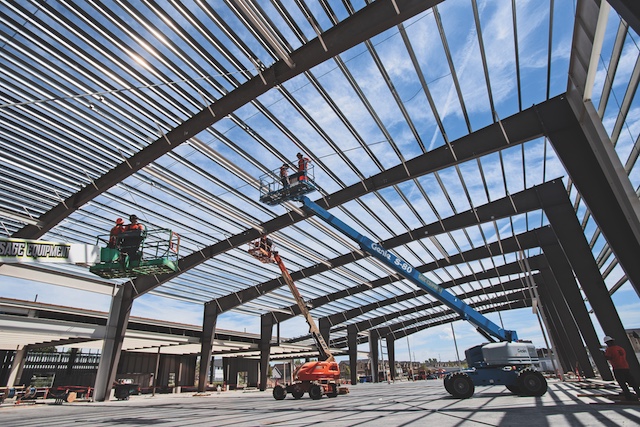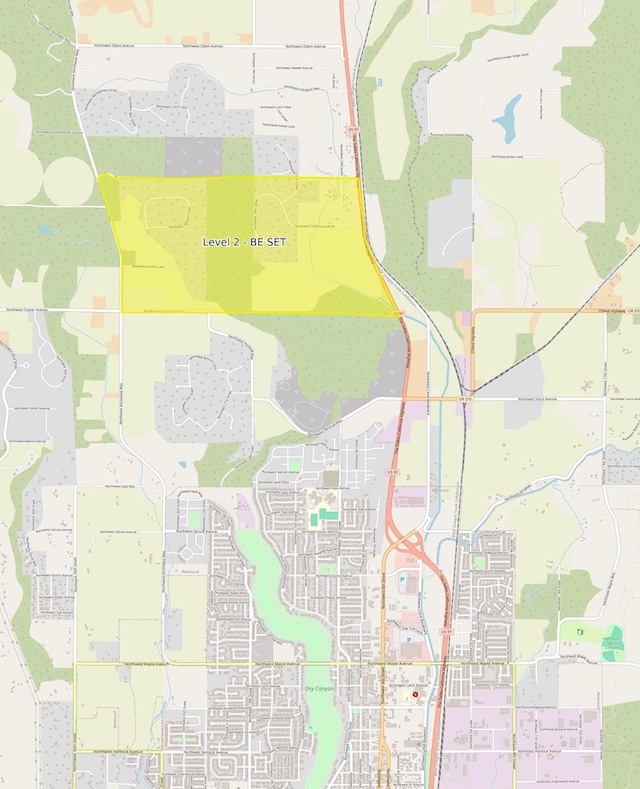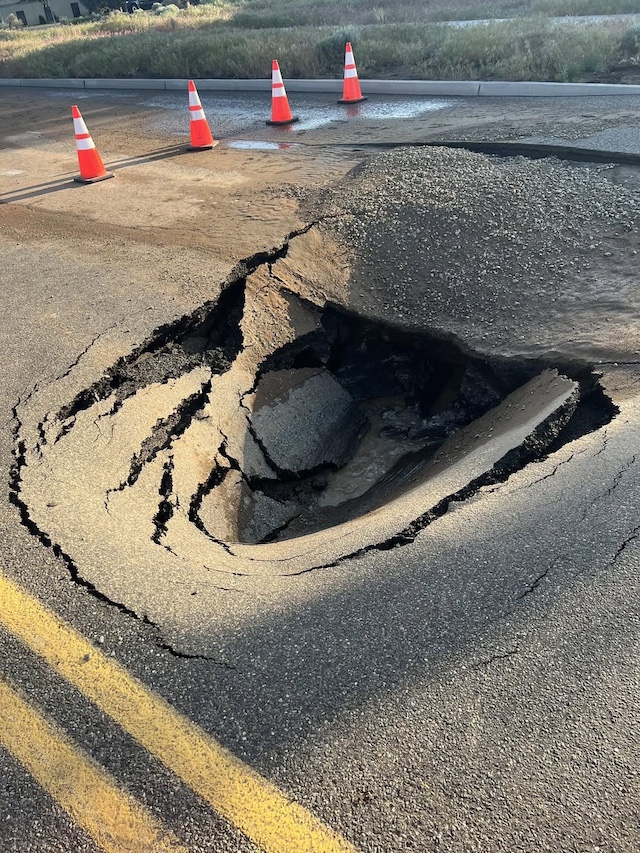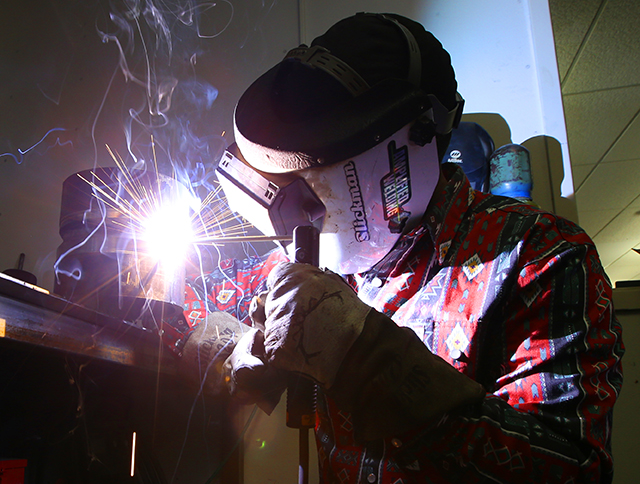Committee considering future of Redmond High sees building’s problems up close
Published 7:45 am Thursday, January 18, 2024

- Members of the committee appointed to make a recommendation on what the school district should do with Redmond High School gathered for a tour of the school on Jan. 11.
A committee tasked with considering the long-term feasibility of Redmond High School said it is too early to make a recommendation on whether or not to invest many millions in taxpayer dollars and disrupt students for at least one year in order to save the school.
Members of the roughly 30-person bond committee toured the more than 50-year-old building on Jan. 11, including its asbestos-laden ceiling, failing roof and HVAC system.
In February, the district plans to provide concrete financial estimates for a number of district construction projects, and also poll the public to gauge community priorities. One alternative the Redmond School District has under consideration is closing the school and teaching all traditional high school students at Ridgeview.
A draft recommendation from the committee is expected to be presented to the school board by April. The school board is expected to get public feedback in May, then possibly in July craft a bond for the November ballot that would replace an expiring tax measure. Though what that bond will entail, and what construction projects it would finance, are still in flux.
What are the options?
The district hired construction management firm HMK Company to help the district determine the costs of three possibilities for the Redmond High building.
The first option is to focus solely on repairing the HVAC system, which the district said it plans to do partially and already has $6.2 million in funds allocated. Part of that repair process would simply be a “Band-Aid” according to construction officials, and would result in more expenses down the line when the current system eventually fails.
The second option includes repairing and updating parts of the HVAC system, replacing the roof, and removing and replacing parts of the ceiling as well as removing the asbestos that gets disturbed during construction. This option is roughly estimated to cost between $20-$25 million.
The third option is the most extensive and expensive. It would include a full HVAC system repair and update as well as the ceiling, roof and asbestos removal. That is estimated to cost between $30-$35 million.
The more permanent fixes would require painstakingly scraping off asbestos-laden fireproofing material that covers nearly the entire roofing structure of the building, and removing large sections of the ceiling to allow access to parts of the building that maintenance crews cannot currently reach.
The options are limited, according to Redmond School District superintendent Charan Cline, because of a maintenance backlog that has left the HVAC system far beyond regular repairs.
“It is cheaper in the long run to maintain what you have and make sure you are continually fixing it up (rather) than tearing it apart and putting it back together,” Cline said. “This piping should have been replaced quite a long time ago. Nobody had the money to do it at the right time, and now we are at the point to where we need a complete replacement. It makes it more expensive than if we would have done it in time.”
If the district chooses to go the route of a full system repair and renovation of Redmond High, it would have a significant effect on Redmond students. During a likely year-long construction phase, students would either need to be bused to Ridgeview or millions would have to be spent on temporary, modular buildings erected on property at Redmond High. Students would need to spend the entire school year in the makeshift school, and eat lunch in a large tent.
Who will make the recommendation
Ultimately, it will be the community which will decide on the bond’s passage.
Committee members told The Spokesman they hoped voters will consider what is best for the students first and foremost when they go to the ballot box.
“It is not just about the schools and the cost, it’s about the whole program. The only one thing that the community must do, no matter what happens, is they have to pass the bond,” said Marvin Kaplan, a member of the bond committee.
Kaplan said he understands why emotions are high over the possible closure of Redmond High, but he urged people to consider the safety and education of current and future students.
Dave Bergman, a local business owner, is also on the bond committee. He said it only makes sense to use the resources the district already has — the newer, bigger high school at Ridgeview — to ensure what is best for students and taxpayers.
“It has to be done. Something has to be done,” Bergman said. “Let’s look at the kids’ needs, not the fact that your grandson graduated from Redmond High School and it will be gone.”
For Bergman, it only makes sense to transfer students to the newer, larger school. He thinks fixing Redmond High would be too expensive.
“Lifting that roof off of that building and doing those repairs, you see, that eats up 40 to 50 percent of the bond,” Bergman said. “What I have learned in this process is (that) nothing really affects the kids more than a healthy, safe, environment. And that has much to do with their education as the subject matter of what they are taught. That is why, to me, putting these kids in a tent city (temporary modular school) in some respects is a lost generation.”
The big picture problems
Chad Franke is the regional director of HMK Company, the construction management firm selected to help the district with a long-term facilities plan. He has spent the past three years consulting on what the next steps should be, and is intimately familiar with the challenges at Redmond High.
Franke said that while consulting on the district’s last set of bond projects, it was clear that addressing the HVAC system was not in the budget.
“The ideal solution is to replace the pipes where they were originally put and really put the school back to like new. But we ran out of budget in order to do that,” Franke said. “Then it got to the point where, ‘How much of this conversation is really a Band-Aid and not actually solving the problem.’”
The HVAC system at Redmond High consists of a wet side and a dry side, Franke explained. The dry side circulates air around the building, and can easily be modernized and made more efficient. It is the wet side, Franke said, which consists of four pipes that constantly move water in a loop around the entire building, that will be expensive and — eventually — necessary.
“They are holding water, which is great. How long is that going to last? That is the big question,” Franke said. “And at any point in time we can just get more leaks and more leaks and more leaks, and if we have 100 leaks all over the building, then what are we doing? We really have got to solve that challenge for this school to keep it viable as a building for however long.”
Currently, the school has to keep the boiler system running constantly in order to prevent the system from cooling down and leaking a rust inhibitor known by the maintenance team as “pink goo.” A new system would also save the district money on operation and energy costs, Franke said.
In order to replace the piping system, the roof would have to be updated as well, Franke said. He said the process would involve removing large sections of the ceiling, which are suspended from the roof. For safety reasons, that would mean that students could not access the building during construction.
Franke said the building remains solid and structurally sound. However, in order for the building to continue to function as such, work must be done. He said he leans more toward a holistic fix rather than a near-term cheaper alternative, which he says often costs more in the long run.
“It can be a viable building for the future, but the systems that are within it are aging out. We need to address that…You have to keep kids warm, safe and dry,” Franke said. “I live here, too. I am a taxpayer here, too. I want my dollars to go to the right things. I don’t want to spend $3 million to go fix part of it when there is a bigger picture.”
Cline said the district feels like it has an opportunity in November and they don’t want to miss it. The committee and the school board will work through May on what the final ask will be.
“We have the opportunity in 2024 to pass a bond without raising the tax levy on anybody,” said Cline to members of the committee.





